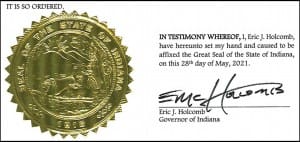Extension of governor’s health emergency means Monroe County, Bloomington local government meetings can stay electronic through June

On Friday, Indiana governor Eric Holcomb issued a new emergency health order that extends through June 30 the current one, which was set to expire at the end of May.

That means many local governing bodies in Monroe County and Bloomington will continue for the next month to hold their meetings on a video-conference platform, instead of in person.
That’s allowed, but not required, under the governor’s current emergency health order.
On Friday, president of the board of county commissioners Julie Thomas told The Square Beacon that the regular meetings of the board of commissioners would take place on Zoom through the end of June. But starting in July, meetings of the commissioners will be in-person, with an option for the public to attend on Zoom, Thomas added.
That means the June 2 meeting of the county commissioners will be held on Zoom.
Bloomington city council administrator Stephen Lucas responded to an emailed question about the council’s June 2 meeting, in light of Friday’s extension of the governor’s order, by writing, “I believe the council will continue to meet virtually for the duration of the public health emergency.”
Lucas added, “If [the council] decides to make an in-person option available before the end of the public health emergency, we’ll publicize that fact in the meeting notice and packet that gets sent out.”
The governor’s order does not mean that meetings have to be held on electronic platforms.
The county’s election board was set to be the first prominent local governing body to hold an in-person meeting in the 14 months since the pandemic hit.
Monroe County election supervisor Karen Wheeler sent out an email announcement on Friday saying the board’s Thursday’s June 3 meeting would be in person, but with an electronic option for the public.
But in a followup email a couple hours later, she wrote, “It will not be an in-person meeting. It will only be a Zoom meeting. Governor Holcomb has continued the public health emergency until July 1, 2021.”
It would not have been a surprise, if Holcomb had not extended the emergency health order on Friday.
When the governor’s order does expire, local governing bodies will still be able to meet in a hybrid in-person-electronic way, based on legislation adopted by the state legislature this year. In the past, Indiana’s Open Door Law had ensured that meetings of public bodies had to take place in person.
Under the new state statute [HEA 1437], members of a governing body can, in a more limited way, still participate in meetings from a distance, by using electronic platforms—if they adopt the necessary policies.
In recent weeks, local governing bodies, like the board of county commissioners and the Bloomington city council, have adopted the required policies for electronic meeting participation under the new statute.
Under the policies adopted by the county commissioners and the city council, rank-and-file members of the public are supposed to be able to participate remotely in future meetings, even if there is no emergency order in place.
Named in the new statute as examples of meetings where remote participation is not an option, include those occasions when decisions are made about: adopting a budget; making a reduction in personnel; initiating a referendum; establishing or increasing a fee; or establishing or increasing a penalty.
The new state statute says that a member of a governing body can’t attend more than two meetings using an electronic platform, subject to certain exceptions. The statute also requires that for any meeting, at least half of the members of a governing body attend in person.
A combined calendar of county and city event feeds is maintained by The Square Beacon. The calendar events typically include a link for Zoom access, if the meeting is held on Zoom.




Comments ()